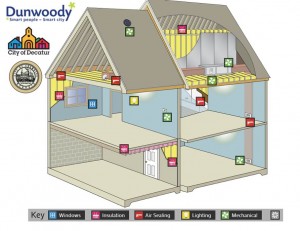 Wednesday, April 16
Wednesday, April 16
7-9pm | Decatur City Hall
While the bulk of the Unified Development Ordinance (UDO) project is cleaning up and better organizing our existing codes, it also presents opportunity to dig down into certain areas that have been identified by the community for further study. On Wednesday, April 16, that digging will lead us to focus on issues related to sustainability: high performance buildings, outdoor lighting standards, animals, and parking.
The session, which runs 7-9pm, will explore the various green performance issues on the table and provide an overview of exactly what “menu of options” is available for consideration. As a participant, you’ll then have opportunity to evaluate each according to either do not regulate, require, or encourage, share your feedback on what rules or regulations seem most appropriate (or not), and which ideas you think would work best.
Here’s what we’ll hit:
High Performance Buildings
High performance building is the practice of creating structures and using processes that are environmentally responsible and resource-efficient throughout a building’s life-cycle — from design, construction, operation, and maintenance, to renovation and deconstruction. Such buildings reduce energy costs, improve indoor air quality, and provide greater, more consistent comfort. We’ll detail high performance building practices that could be incorporated into Decatur’s ordinance, along with their potential long-term costs and benefits.
Some of these most common performance issues are nicely summarized in this cool interactive overview from Southface.
Outdoor Lighting Standards
Decatur currently lacks regulations to reduce light pollution, despite increasing scientific research on the negative health and environmental impacts of excessive lighting at night. Potential changes to the ordinance include regulations about the types and placement of fixtures to control the unnecessary spread of light.
Animals
Chickens have become quite popular in Decatur, contributing to food, fun, gardening and education. Is everything working okay or does the number of chickens on any one lot need to be restricted? And what about potbellied pigs and pygmy goats? Should they be explicitly allowed or prohibited? Because, currently, the code is unclear either way.
Unbundled Parking
Today, parking is bought indirectly through the lease or purchase price of a property, which — beyond the environmental impacts of excessive parking — works against our affordable housing goals because it forces buyers and tenants to purchase parking, even if they have no car (or have fewer cars). Unbundling treats parking as separate from housing and allows tenants to save money by only buying what they need. People are still free to purchase what they require but those who need or choose to live without a car are no longer penalized.
For those of us in Decatur who believe the city planning process, from the two Strategic Plans to the UDO meetings, has always been rigged in favor of expanding government, more regulation and control, and increasing the influence of liberal special interest groups, this meeting was typical. The presenters made no effort to explain the benefits of “No New Regulations” but surprised me in their enthusiastic support for new rules. The first presenter identified herself as a “passionate supporter of environmental sustainability”. She invited her friends in the green building movement to the meeting to act as experts should any of us have questions about the proposed regulations. When asked about the effect of these proposals on the city’s goal of more affordable housing, she hesitated and allowed the director of development to interrupt with something like, “We’re working on resolving this”. When I asked for specific information showing the increase in costs to a $50,000 renovation, I was told that “this is coming and the commissioners will have it before June”. The second presenter began by telling us that recent science confirms the dangerous effects of light pollution. Both individuals appeared to me to be cheerleaders for more regulation. At the very least, city employees and their hired consultants should appear to be impartial.
Based on the information that was presented at the meeting, I would strongly oppose additional code regulations for new commercial and residential buildings and renovations. I also oppose additional requirements on the sale of property. These proposals would greatly increase building costs and the power of government in our lives. I would also oppose any new regulations on residential lighting. I am concerned that unbundled parking will lead to more visitors parking in residential neighborhoods. The only item I had any support for was possible new regulations on animals. I can’t imagine how difficult it must be living next to someone who owns numerous farm animals like chickens, goats, pot belly pigs and cats. I would like to see what specific limits are being considered and if it seems reasonable.
But don’t even think about more regulations concerning dogs.